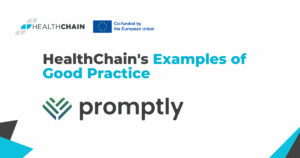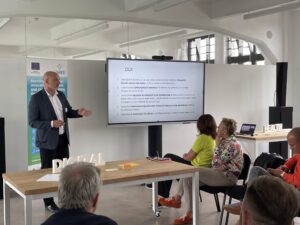One of the HealthChain’s activities for enhancing interregional cooperation between project regions is Knowledge Sharing Series.
The Knowledge Sharing Series is a collaborative initiative within WP2 led by Promptly. Its purpose is to analyze forthcoming solutions and identified challenges, fostering an interregional discussion on common areas of focus. The objectives include identifying synergies between regions, sharing experiences, and pinpointing opportunities for collaboration.
Topics for discussion within the series are defined based on data gathered from Implementation Action Plans across regions.
Total of three (3) Knowledge Sharing Series have been organized from the beginning of the project. Evidenze led a session on Patient Data Management and Interaction Between Patients and HCPs. Promptly led a session on Questionnaires, Remote Patient Monitoring and Patient’s Self-management. HealthLord led a session on Patient Ownership and Patient Health Data Management.
These are the main insights from the latest series held by the Slovenian IT company HealthLord about Patient Ownership and Patient Health Data Management.
Despite patients’ declared ownership of health data, the actual role of controllers is played by governmental institutions, healthcare providers, and health insurance companies. Patients remain with limited accessibility and transparency of their health data dispersed among various actors.
It is high time for patients to become the actual owners and managers of health information, data, and documents. By doing so, patients take on responsibility for their health and gain additional motivation for better health and disease management.
Health-related data should be consolidated in a single, unified platform accessible and manageable by patients, ensuring completeness, comprehensiveness, accuracy, and reliability. This comprehensive repository should encompass healthcare documents, personal health history, familial traits, genetic information, and relevant bio-parameters. Upholding privacy, safety, accessibility, ease of management, user control, portability, transferability, interoperability, and exchangeability with patients’ consent are paramount considerations. While anonymized data may serve scientific and research purposes, individuals should derive tangible benefits from sharing personal data with biobanks.
As healthcare systems undergo continuous transformation, patient ownership and management of health data are poised to remain focal points in advancing patient-centered and efficient care. This is the case despite several challenges related to patient health data management persisting, including security concerns, interoperability, control, data accuracy and quality as well as ethical use. Balancing the interests of individuals, healthcare providers, researchers, and technology companies is a complex challenge where patients and health providers should have top priority.
The sustainable progress in healthcare needs a balanced integration of biotech and social innovation. Consequently, our focus is on introducing a novel healthcare approach, called as “mobile health management,” alongside the implementation of appropriate ICT tools.
The historical evolution of ICT and Electronic Health Records (EHR) in healthcare has predominantly aimed at supporting transactions, financial control, identity verification, and professional credentials. While later stages introduced IT support for documents and processes within healthcare, including EHR, e-prescriptions, and seamless care, there remains a notable absence of ICT support for patients and interoperability with healthcare providers. Recent advancements, such as the Mobile Health Record by Gospodar zdravja – Healthlord, facilitate collaboration between patients and healthcare providers, revolutionizing health and disease management.
Mobile Health Management is an interdisciplinary, patient-centered approach that aims to achieve individual health targets using advanced information and communication technologies. It empowers patients by giving them ownership and management control over their health data through dedicated ICT tools like the Mobile Health Record.
The evidence supporting the effectiveness of mobile health management (mHealth) compared to conventional methods is robust and involves enhanced chronic disease management, improved medication adherence, expanded access to healthcare, positive influence on health behavior, remote monitoring and early disease detection as well as improved cost-effectiveness and enhanced service quality.
However, the implementation process is time-consuming due to various entry barriers. One primary obstacle lies in the divergent interests of patients and healthcare professionals, as identified in our research. Health professionals have deemed the following functionalities of ICT tools significantly less important compared to patients’ perceptions:
- Remote access to healthcare services and products from home.
- Provision of pricing information for healthcare services and treatment products.
- Transparency and insight into the accessibility and performance of healthcare providers.
- Access to remote second opinions on health and illness.
- Utilization of E-safe consultations.
In addition, there are several other entry barriers, both formal and informal, related to patients, healthcare providers, the regulatory environment, procurement processes, and various other factors.
In conclusion, patients are encouraged to play an active role in managing their health, which includes taking charge of their health data. By collaborating with healthcare providers, patients can explore opportunities for improving their health through mobile health management.
Full article is available on the following link:
Author: Gorazd Hladnik, Health Lord (Gospodar Zdravja)








